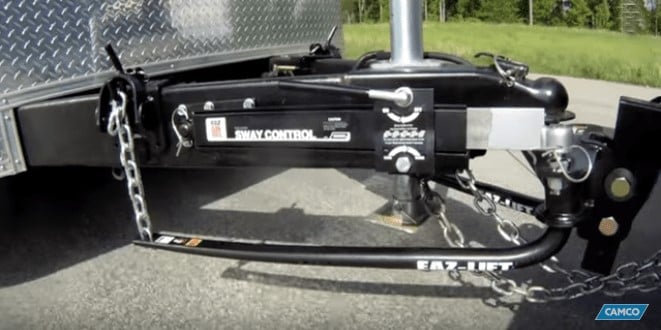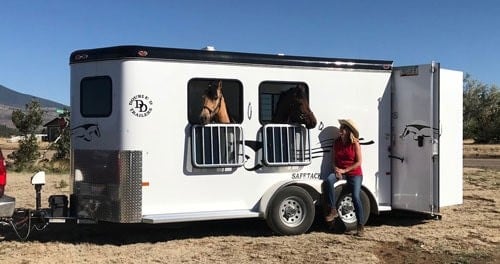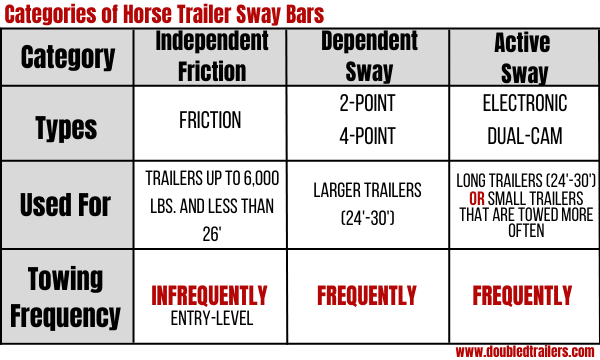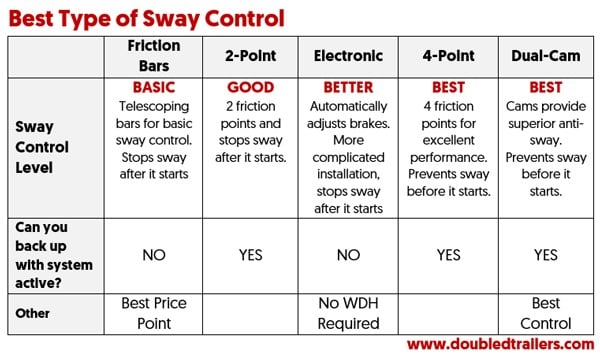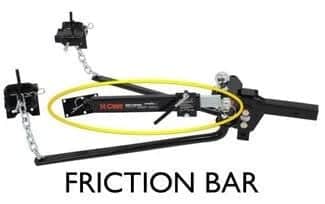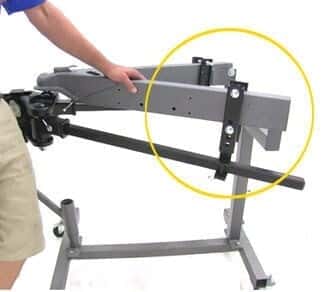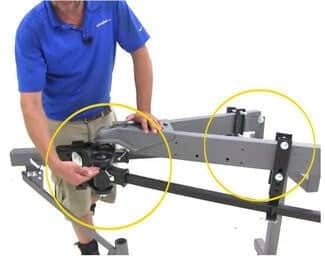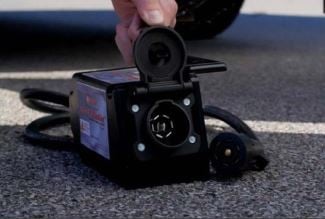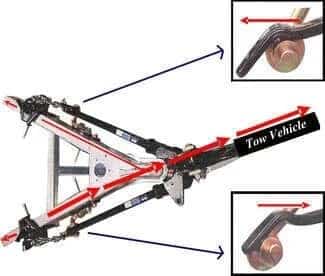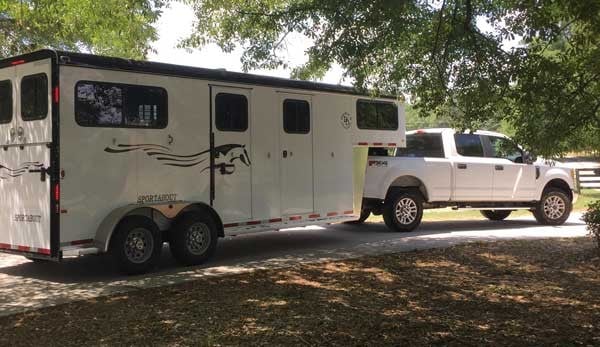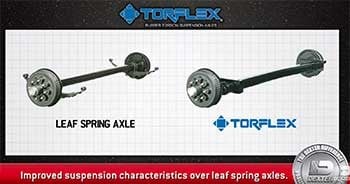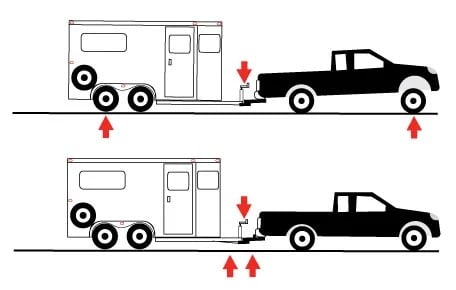Do Sway Bars for Trailers and Trailer Axles REALLY Improve Your Towing Performance?
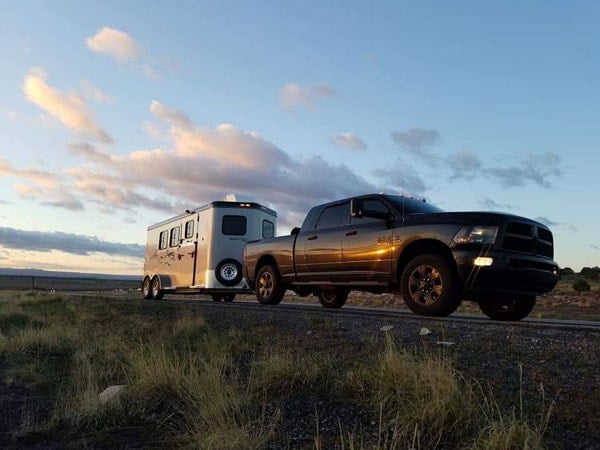
Have you ever driven your trailer through a wide open area on a very windy day? If you have, you’ve probably felt your horse trailer start to sway from side to side behind your truck. This unnerving sensation can be frightening even for experienced drivers.
Strong gusts of wind can cause horse trailers to move uncontrollably. If the driver doesn’t know how to stabilize the trailer, it could result in a dangerous accident. But trailer sway doesn’t just happen on high wind days. It can happen while you’re safely driving along a road you’ve driven on hundreds of times.
Let’s jump right into revealing everything that you need to know about sway bars for trailers and trailer axles so that you can make sure that even on the windiest of days, you are safely towing your horse trailer.
Why Does My Trailer Sway?
There are a few different reasons why trailer sway happens. As a trailer driver, some of these reasons are beyond your control. But sometimes, trailer sway is caused by reckless or unsafe driving, or having the wrong tow vehicle, both things horse owners can change to quickly correct the problem and eliminate trailer sway.
Knowing why your trailer is swaying is the first step to correcting the problem. Here’s five common reasons why trailer sway is affecting your trailer performance:
1. Strong Gusts of Wind
Your trailer can start to fishtail because of a large gust of wind while driving in an open, high-wind area. The intense burst of air flow can cause your trailer’s tires to lose their grip on the road, causing your trailer to sway. If a burst of wind hits the side of your trailer, your trailer can act like a huge sail and catch the air, pushing the trailer to the side. This can also happen if a large vehicle like an 18-wheeler truck passes your trailer on the road, causing a big gust of air to hit the side of your trailer.
2. Driving Too Fast
Horse trailering requires more caution than normal driving, especially when driving in high wind areas or in bad weather. Driving your horse trailer at speeds above 65 mph is dangerous and puts you, your horses, and your trailer in danger. Always make sure to drive at a safe speed while hauling your trailer.
3. Poor Driving Conditions
Driving in bad weather, especially in rain or snow, can double your risk of experiencing trailer sway. The slippery road surface can cause you to lose control of your horse trailer. For that reason, it’s always best to avoid driving in such conditions. Uneven roads like dirt roads in rural areas or roads that are under construction can also lead to trailer sway.
4. Hauling Too Much Weight
If your trailer’s tongue weight is too much for your tow vehicle to support, it will cause the back of your truck to sink, making your truck unstable. This instability can then cause your trailer to sway. Trailer sway can also happen if the weight in your trailer is not distributed properly. This depends on where your horse trailer axles are located - if the trailer manufacturers put them too far forward in your trailer, it alters the tongue weight and can cause your trailer to be imbalanced.
5. Low Tire Pressure
If you have under-inflated tires, your trailer tires can start to compress. This prevents them from working correctly, and leads to trailer sway. Make sure your tires are always filled to the maximum recommended pressure to prevent tire blowouts and trailer sway.
How Horse Trailer Parts Affect Towing Performance
But, the best way to completely eliminate trailer sway during travel is to prevent it before it happens. How? Well, trailer sway happens when a trailer doesn’t have a proper weight distribution or isn’t designed correctly. Trailers that are poorly designed are trailers that are most likely to experience trailer sway on the road.
Your trailer performance doesn’t just depend on your horse trailer suspension or your trailer axle specs. When it comes to having a smooth, incident-free trip while traveling, all your horse trailer parts should work together in harmony to drive smoothly. However, when manufacturers use cheap parts or design a trailer poorly, your trailer is more prone to have problems while on the road.
You can avoid trailer sway and other serious problems by investing in a properly designed horse trailer. Horse trailers that have proper weight distribution and a safe towing capacity are trailers that move straight and true while on the road.
Pulling a trailer without sway bars is simple and easy…if that trailer is properly designed and well built. But, if you have a trailer that sways constantly on the road, there’s likely construction issues and weight distribution issues that can be temporarily corrected with sway bars for trailers.
What are Sway Bars for Trailers?
Sway bars for trailers are stabilizing bars that you can install in your trailer’s hitch area to strengthen and stabilize the connection between your tow vehicle and your horse trailer. The extra stabilization that comes from the horse trailer sway bars stops sway after it starts and helps you to quickly regain control on the road.
When your horse trailer starts to sway and move uncontrollably while you are driving on the road, it can be a nerve-wracking moment. If you don’t stabilize your trailer quickly, you could easily end up in a terrible road accident.
Trailer swaying can happen when you are driving in unsafe weather conditions like strong winds that destabilize your trailer or in rain or snow that can cause a dangerous road situation. It can also happen if you are driving too fast or if your tires don’t have enough pressure.If your trailer performance is negatively affected by trailer sway, one solution is to add sway bars for trailers.
How Sway Bars for Trailers Work
Some of the problems mentioned above can be easily fixed by avoiding driving in dangerous weather conditions and always driving a safe speed while hauling your trailer. Other problems, like having a trailer with an improper weight distribution, are manufacturing issues that can’t be so easily corrected.
In these cases, the best option is to invest in a safe horse trailer that drives smoothly and safely on the road. But, if you need a quicker fix, or need to keep using your old trailer while your new horse trailer is being built, you can buy and install a sway bar for trailers.
Sway bars for trailers are designed especially for bumper pull horse trailers and are made to either stop or limit trailer sway after it starts, or prevent sway before it happens. Bumper pull sway bars for trailers help ensure a smoother trailer ride for your horse and a safer driving situation for you.
There are three main categories of horse trailer sway bars:
-
Independent friction sway control
-
Dependent sway control
-
Active sway control
The first one, independent friction sway control, stops sway after it starts by using a telescoping bar and friction pads. The second category, dependent sway control, comes as part of a weight distribution hitch and uses friction and springs to prevent sway. And the third category, active sway control, uses cams instead of friction to prevent sway before it even starts.
The 5 Types of Sway Bars for Trailers
Let’s take a closer look at these different categories and the different types of bumper pull sway bars available on the market.
1. Friction Sway Bars (Independent Category)
This is the most affordable option, and works very well for smaller trailers. On these bumper pull sway bars, one end attaches to your trailer frame and the other end attaches to your weight distribution hitch.
It has a telescoping bar that uses tension to prevent sway when you are trailering. With this type of trailer sway bar however, you can’t back up while the system is active. To back up into a parking spot or anywhere else, you’ll have to disconnect the stabilizer bar.
2. 2-Point Sway Control (Dependent Category)
Like many trailer stabilizing bars, this one is built into your weight distribution hitch. It has brackets that can go on either side of the trailer frame. The spring bars rest on these brackets and move back and forth to keep your trailer moving straight. Like the friction sway bars, the 2-point sway control also uses friction to avoid sway.
3. 4-Point Sway Control (Dependent Category)
This type of horse trailer sway bars is very similar to the 2-point sway control bar above, but has four friction points instead of two. It also attaches to the weight distribution hitch, but unlike the 2-point sway control, this system prevents sway before it starts, making for much smoother travel.
4. Electronic Sway Control (Active Category)
As you can tell from the name, electronic sway control systems work electronically - they activate your trailer’s braking system based on how fast you are going and how much sway is happening. This works to stop sway before it even starts. These systems are more complicated to install but the benefit is that they work without a weight distribution hitch.
5. Dual-Cam Sway Control (Active Category)
These types of sway bars for trailer towing work great for trailers with a weight distribution hitch with curved spring bars. They have dual-cam stabilizers that cradle the curved bars and stabilize them when they start to move. This technology stops sway before it starts, making it one of the best sway prevention systems.
What Are the Best Brands of Sway Bars for Trailers?
Here at Double D Trailers, since all our trailers are expertly designed from the ground up, they don’t need any type of sway control. For that reason, we haven’t had to recommend horse trailer sway bars to any of our customers.
That being said, some horse owners and trailer owners ask what the best stabilizer bars are. Our top recommendations are the Reese Friction Bar or Dual-Cam Systems and the Equal-i-zer 4-Point hitch - both come highly recommended by top experts.
But, do remember that it’s always safer to invest in a properly designed horse trailer that has the right weight distribution than to buy additional expensive add-ons for a trailer that’s incorrectly designed and prone to road accidents and mishaps.
Everything You Need to Know About Horse Trailer Axles
Horse trailer axles are another important horse trailer component that affects how smooth your trailer tows. With a properly adjusted horse trailer suspension and the right horse trailer axles, you’ll be able to avoid uncomfortable, bumpy rides, even on back country roads.
However, when it comes to choosing the best horse trailer axles for your custom designed horse trailer, you’ll have to do a little bit of math to figure out what strength of axles your trailer needs. But don’t worry! Keep reading and we’ll walk you through all this and more. Here’s everything you need to know about horse trailer axles…
What Are Horse Trailer Axles?
First things first - what are horse trailer axles? Well, just like on any type of vehicle with wheels, axles are the metal rods or shafts that support the weight of your vehicle and connect to the wheels, rotating them while you drive. Without axles, the wheels on your horse trailer wouldn’t move.
Having the right type of axles on your horse trailer is super important for horse trailer performance. With horse trailer axles that are overrated or underrated, you put your horses at risk of a rough, stressful, and bumpy ride. With correctly rated axles, you and your horse can have a safe, smooth trip without any problems.
Horse Trailer Axle Specs - Are Your Trailer Axles Overrated?
Many horse owners, when designing their trailer, think that they need to have super heavy duty horse trailer axles to be able to haul their horses successfully. They think that since they have large breed horses and will be hauling a heavy load, the stronger the axles the better.
However, when it comes to trailer axle ratings, bigger is not necessarily better. In fact, if your horse trailer axles are overrated, your horse trailer performance will be much worse than if you had the correct axles. Don’t believe it? Well, take a look at what happened to one horse owner who insisted on super high capacity axles…
This customer purchased a small 2 horse gooseneck trailer and added a small dressing room. He had two average-sized horses, so the total weight of his loaded horse trailer was about 6,000 lbs. The customer said that he often took his horses on long trips, and in the past with other trailers, he had bad experiences with tire failure and axle failure.
He insisted that his new Double D Trailer needed 12,000 lbs axles with 16 inch tires. Brad Heath explained that since this new Gooseneck trailer had a proper weight distribution, he didn’t have to worry about axle and tire failure. Brad warned him that over rated horse trailer axles were a bad idea.
But, the customer insisted, so Brad build the trailer just like the customer requested it. The customer was thrilled and picked up the trailer, paid for it, and headed home. But the customer never made it home - as he tried to drive his trailer home, he realized that it was way too bumpy and his horses would never be able to travel in such a bumpy trailer.
Back at the shop, Brad switched out the over rated axles for a 7,000 lbs suspension (the same one he had recommended previously), and the difference was night and day. The customer left the shop with a smooth riding trailer and learned an important lesson - having the right axles makes all the difference.
Prevent Trailer Damage - Avoid Underrated Axles
And just like overrated axles can make for a bumpy, uncomfortable ride, under rated axles can be just as bad. If your trailer’s suspension isn’t strong enough to support all the weight of your trailer, you could be putting yourself and your horses at risk of a terrible accident.
If you make any additions to your trailer or start to haul a weight that’s beyond what your trailer is capable of, you’ll start to see the wheels bump up against the trailer fenders. If you notice this red flag, your trailer’s suspension and horse trailer axles need to be changed as soon as possible.
Hauling a heavy trailer with too weak of a suspension could result in horse trailer axle failure which could not only damage your trailer but also put you and your horses in danger. For your horse trailer to always provide a smooth and problem-free ride, it’s essential that your horse trailer axles are the correct rating.
Axles that are too high capacity are stiffer and cause a bumpy, uncomfortable ride. Axles that are too light need frequent repairs and also can cause you to go through a lot of tires because the heavy load will cause your axles to overheat.
Horse Trailer Axle Types
To choose the right type of axles, first you need to figure out your Gross Vehicle Weight. This important number is the total weight of your fully loaded horse trailer. So, if your horse trailer alone weighs 6,000 lbs and you have two horses that weigh 1,000 lbs each, and you plan on hauling 1,000 lbs of hay and supplies, your Gross Vehicle Weight is 9,000 lbs.
Now that you know the total weight of your horse trailer, you can calculate your trailer’s necessary Gross Axle Weight. This number is how much weight is directly supported by your horse trailer axles. Usually, this number is 75 to 80 percent of your trailer’s Gross Vehicle Weight. So, in the example above, if you take 75% of 9,000, you get 6,750 lbs. Divide this number by 2 (because your horse trailer has two axles), and you get 3,375 lbs. That means that each of your trailer axles should be rated just over 3,375 lbs.
Don’t fall into the trap of thinking that more is better with horse trailer axles. You want your trailer’s axles to help your trailer drive smoothly but also have enough free capacity to protect the horse trailer suspension.
At Double D Trailers, during the construction phase, all horse trailers are equipped with an independent horse trailer suspension system called Dexter Torflex rubber torsion suspension axles. These horse trailer torsion axles are stronger than typical horse trailer axles because they have a torsion arm that attaches to the trailer frame.
These axles are unique because they have rubber cords that cushion the main axle bar and absorb the shock from the road. They don’t have any metal-on-metal moving parts, allowing them to last longer than typical horse trailer axles. Torflex trailer axles on Double D Trailers make for a smooth, quiet ride.
The One Thing That MOST Affects Your Horse Trailer’s Towing Performance
While horse trailer axles, tires, sway bars for trailers, and suspension are important, the one factor that most affects your horse trailer’s towing performance is actually the very construction of your horse trailer. The right quality building materials can make a huge difference between a wobbly, unstable trailer and a smooth-riding quality one.
And, even more importantly, if your horse trailer is not properly designed, the weight ratio will be skewed, causing trailer sway. The weight distribution of your trailer is something that’s very difficult and expensive to fix once you’ve already purchased it. That’s why it’s so important to find an expert horse trailer manufacturer that knows how to correctly design and build your horse trailer.
What is Weight Distribution and How Does It Affect How Smoothly My Trailer Rides?
Weight distribution has to do with how evenly spread out the weight you are hauling is in your trailer. Take, for example, a moving trailer filled with boxes, a refrigerator, and a couch. To make sure all your things arrive safely, you wouldn’t dare put the refrigerator standing alone in the moving truck. Probably you’d put it in the corner, and surround it with the boxes and the couch to make sure your things didn’t fall and break.
When hauling items like furniture and boxes, weight distribution is easy - you simply stack your things in rows and organize it so that it doesn’t fall down when you’re driving. But, when you are hauling large living animals that move around, you can’t just put them in any old trailer.
To ensure that your trailer moves smoothly and successfully (even when your horse is moving around in the trailer) your trailer needs to be built so that both the trailer weight and your horse’s weight is evenly distributed.
When there’s too much weight towards the front of your horse trailer, the excess weight makes your truck dip and lifts the front end of your truck slightly off the ground. This is called “dive” and it can be dangerous because it makes front-wheel steering more difficult.
If your horse trailer isn’t designed to correctly distribute your horse’s weight, to correct the problem you’ll have to buy an additional weight distribution system and attach it to your tow vehicle and trailer. To save yourself a headache, it’s much better to invest in a well-built, professionally designed trailer in the first place.
Here at Double D Trailers, our trailers are designed so that the horse trailer axles are positioned to be able to support the weight of your trailer no matter where your horse is positioned or how large or small your horse is. This assures that both you and your horses have a smooth trip, and eliminates the need for horse trailer sway bars or weight distribution systems.
Investing in a well-designed horse trailer will save you headaches, accidents, and trailering mishaps while on the road. Double D Trailers are made using the latest technology and only the best materials. Discover what makes Double D Trailers the best option for you - start customizing your unique horse trailer today. Have a question about sway bars or horse trailer weight distribution? Send Brad an email today and he’ll get back to you as soon as he can.
Frequently Asked Questions
What are sway bars for trailers?
Horse trailer sway bars are stabilization systems that you can install in your trailer's hitch area to strengthen the connection between your tow vehicle and trailer. Sway bars for horse trailers minimize sway by correcting trailer movement after sway starts or stopping it before it begins.
What are the best horse trailer tires?
Choosing the right tires for your horse trailer is similar to choosing the right horse trailer axles. Tires that are too highly rated are stiffer and make for a bumpier ride. Tires that are too low capacity put you at risk of a tire blow out. We recommend “ST” tires instead of “LT” tires because tires that are meant for extra heavy loads put too much strain on your horse trailer axles, brakes, and hitch. Make sure to choose tires that are the correct rating for the amount of weight you're hauling. This is the best way to ensure a smooth, safe trailer ride.
Does horse trailer suspension affect towing performance?
Yes - having an over rated horse trailer suspension system will make for a very bumpy ride because your horse trailer axles will be too stiff to drive smoothly. An under rated horse trailer suspension won’t be able to support your trailer’s weight, will cause overheating in your trailer axles, and will lead to frequent breakdowns and part repairs. Assuring that your suspension system is the correct rating for your Gross Vehicle Weight will improve towing performance and keep you and your horses safe on the road.
What size trailer axle do I need?
To calculate what size trailer axles you need, first, figure out your Gross Vehicle Weight. This number is the weight of your fully loaded trailer (including the weight of your horses and supplies). The Gross Axle Weight should be 75% of the Gross Vehicle Weight. Then, divide this number by two to determine how much each of your horse trailer axles should be rated.
How do I figure out my trailer axle capacity?
Your trailer axle capacity is the amount of weight your axles can support. For most trailers, the Gross Axle Weight is 75 to 80 percent of your trailer’s Gross Vehicle Weight. So, if your Gross Vehicle Weight is 9,000 lbs, your Gross Axle Weight is 6,750 lbs, meaning that each horse trailer axle must support 3,375 lbs.
Does the brand of horse trailer axle matter?
The quality of the horse trailer axle brand affects the strength and durability of your horse trailer axles. At Double D Trailers, we use Dexter Torflex rubber torsion suspension axles. This brand of horse trailer axles provide the quietest, smoothest ride for you and your horses. The torsion arm for added strength, extra rubber cords that provide cushioning and added support, and the durable construction is what allows Dexter Torflex axles to outperform the competition.
Do I need a double axle horse trailer to safely pull my large breed horses?
You can safely pull heavy loads and large breed horses in a normal, single axle horse trailer, as long as the trailer is built correctly and has the correct weight distribution. Double axle horse trailers are designed specifically for hauling extra weights, but are bulkier and more difficult to maneuver than normal horse trailers. Before settling on a double axle horse trailer, reach out to Brad Heath to see if your large breed horses could be safely transported in a normal horse trailer.

